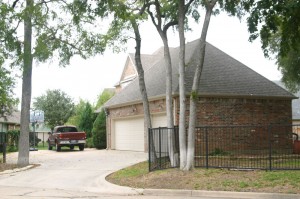Gore would later join Texas Community Association Advocates, a group that represents Texas homeowners associations and is striving for more standardization of rules and enforcements. She acknowledged a few bad apples but said the associations are mostly composed of “good people trying to do good.”

She wasn’t aware of RiverBend and its disputes, but she expressed surprise at the total lockouts. Some associations use a type of lockout to restrict residents or their visitors from using common areas, but she wasn’t aware of any lockouts to totally block relatives, friends, and even child-care providers from visiting a resident.
“There are different rules for every homeowners association,” she said. “The people who vote in the board members have to make sure they will be fair on their behalf. Folks have to talk to one another and find common ground to move forward.”
When residents and board members have different interpretations of the rules, the board typically prevails.
********
The Weekly called Buck to discuss RiverBend, but he referred questions to Tolbert, the association’s attorney. Buck didn’t seek re-election after his term ended earlier this year.
“I’m not the president any longer,” he said.
Disputes with the Mortons, Aguilars, and other residents occurred while Buck was president. It made sense for him to address them, the Weekly insisted. Buck blamed the troubles on residents with a “blatant disregard” of deed restrictions. Legal actions taken by the association were “an absolute last resort,” he said.
Buck is no stranger to lawsuits. In 2003 he was accused of trying to get commissions on a boat and a trailer home that were sold by someone else. The court cited “intentional interference” with malice by Buck. Court records indicate he was assessed $36,000 in damages and attorney fees.
“That’s a really hard verdict to get in the state of Texas,” Morton said, drawing on his expertise as a business law attorney. “Almost anything goes in Texas. Malice means acting with a bad heart. The jury found he acted with malice, and they fined him accordingly.”
Buck is involved in a current lawsuit as well: Relatives accuse him of failing to pay back a $300,000 personal loan.
“This man is not who he portrays himself to be,” Morton said.
Morton said Buck recruited his private attorney, Tolbert, to become the homeowners association attorney. Morton worried whether the close ties between the president and attorney could create ethical breaches, such as Tolbert doing private work for Buck while being paid by the board.
During our brief phone conversation, I asked Buck if Tolbert had worked for him prior to being appointed as the homeowners association’s attorney.
“I have used him before,” he said.
Did Buck consider that an ethical quandary?
“You need to talk to our attorney; that’s the way we need to handle this,” Buck said. “I really don’t have anything else to say.”

RiverBend asked District Judge David Evans to order the Mortons to reimburse the association for its legal costs. The Mortons moved, citing stress from the ongoing dispute, and removed their van from RiverBend. They still hadn’t paid their fines, and so the association filed a lien on their house for $1,430. Evans issued a final judgment in July. By then, the Mortons and the van were gone. Case closed. The judge denied RiverBend’s request to be compensated for attorney fees. The lien on the Mortons’ house remained.
The Mortons dodged a bullet. Assessing attorney fees to residents is an intimidation trick used by homeowners associations to scare people into submission, Houston-based attorney David Kahne said.
Kahne doesn’t represent the Mortons, but he has represented numerous homeowners over the years, including Geneva Brooks. The Houston woman and several of her neighbors battled the Northglen Association over what they considered excessive late fees and attorney fees related to unpaid dues. A Texas Supreme Court decision in 2004 supported her argument and became a rallying cry for reforms.
In a more recent case, Kahne described a Houston woman who owed her association $94 in a disputed penalty and late fee. The association sued for the $94 and tacked on several thousand dollars more in attorney fees.
“It’s ludicrous that a dispute over $94 should go to court, but if you do, you shouldn’t be able to get several thousand dollars in attorney fees,” he said. “The pressure to give in and give up your rights to avoid the risk is huge.”
He recalled another association that filed a lawsuit against a resident and sought thousands of dollars in attorney fees. The resident’s crime? His basketball goal didn’t have the proper netting. Another association sued one of Kahne’s clients for growing sunflowers in her yard.
In another high-profile Houston case, Wenonah Blevins helped push the need for reform. The elderly widow got behind on her dues. She owed about $900, and the homeowners association foreclosed on her house and sold it at public auction to pay for her debt and attorney fees. A constable evicted her. News media reports prompted a public outcry. A lawsuit filed by Blevins prompted the association to buy back her home and re-settle her.
“The prospect of throwing Ms. Blevins on the street started an immense backlash,” Kahne said.
The state’s new laws are a good first step in beefing up property rights in covenant-controlled neighborhoods, he said. “But it would be important to build on them this session, and we’re going to try to do that,” he said.
To that end, Kahne met last week with a group of homeowners who are actively working with legislators to expand on recently passed reforms during the 2013 Legislature.
Residents don’t typically appreciate their dues money being spent on court battles. Some, like Ashford, have found themselves on the hot seat for complaining. Ashford attended RiverBend board meetings and objected to the lawsuits and lockouts. He complained of meetings being held without proper public notice. Ashford didn’t like how some of his neighbors were being treated.
“The board did what they wanted to do,” he said. “They didn’t know the laws and didn’t want to know the laws.”
After speaking at a few board meetings, Ashford was silenced. He said board member Matthew Kneisler cut him off by saying that Ashford wasn’t a homeowner and therefore had no voice in meetings. Ashford was stunned. He and his wife, Susanne, have lived in RiverBend for six years and paid their dues regularly. But the house is deeded in Susanne’s name, and she wasn’t at the meeting. Ashford made a stammering attempt to explain community property laws but was shushed.
“That caught me off guard,” he said. “I didn’t know how to respond.”
Like some of his neighbors, he’s wary of speaking to the news media. If the board targets someone, their life could become hell — a very expensive hell.
“It’s something I worry about,” Ashford said. “Nobody has the will or the finances to fight them on it.”












“Since HOAs are very local and small, participants are often neighbors and hence have incentive to settle disagreements in a civil manner.”
– “Free Market Alternatives To Zoning”
The Independence Institute (Denver, Colorado)
February 28, 2009
http://old.i2i.org/main/article.php?article_id=1702
This story seems one sided. The author lost credibility with the personal attack of the HOA President. Why bring the man’s company, charitable works and religious beliefs into this? Seems the disgruntled homeowners are using this to settle a personal vendetta against the HOA President.
If you had even read the article, personal attacks are absolutely appropriate. This especially pertains to tort, such as in this case. Learn to think…
I find it hard to believe that this HOA President made all of these choices by himself. The entire board would have to vote and approve each rule and enforcement. You failed to mention that a local Judge sits on that board or the name of the big law firm the lawyer works for….but you had no problem attacking a local businessman, his religion and his character. I thought the FW Weekly was above this type of Journalism?
“I thought FW Weekly was above this type of journalism” Oh Dear, I guess you missed the one sided hatchet job FWW did on the FW church on I-35 around Labor Day.
“WE BUILD THE PRISONS WE LIVE IN.” Red Desert Penitentiary
Looks like you got yourself some republican resistance here, Jeff.
A hack story produced by a hack “journalist,” published by a hack rag. Poorly written, error-prone, rambling, and with a decidedly one-sided agenda.